Abstract
Caring for a child with the Zika Congenital Syndrome (SCZ) implies a reelaboration of mobility strategies for entire families in a new epidemic context. The work describes the care domains - relational, service and knowledge - formed around a child with SCZ by mothers, institutions and researchers, respectively, and their relation to power. Observations and participation in therapeutic itineraries and interviews were done by a team of anthropologists in a project on the national call for research on Fighting Zika (CNPq/CAPES/DECIT) between 2016 and 2020. It chooses an ethnographic approach to practice and negotiations experienced in different domains by mothers with children with SCZ based on the experience of three mothers in Pernambuco, Brazil. It focusses on care and mobility in residential changes, daily transportation displacements and the reorganization of networks of closely-related persons. It shows that women use family relations to confront barriers to access to service care, to value their own acts, and to favor their insertion in associations, politicizing maternity and favoring the search for rights in this context.
Key Words:
Zika; family relationships; power; mobility; access to rights
